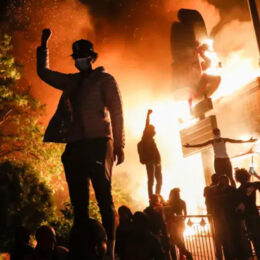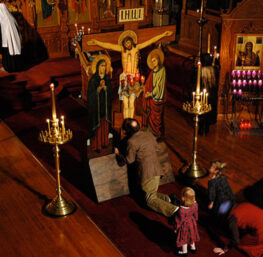By Julia Duin THE WASHINGTON TIMES
Oral arguments were to begin before the U.S. Supreme Court on one of the most litigated questions in American law: Should the Ten Commandments be displayed on government property?
Outside, protesters sang hymns and held up signs proclaiming “The 10 Commandments: The way to live your life.” A few feet away, a larger group clustered around Ellen Birch, a member of American Atheists, who describes herself as a descendant of Thomas Jefferson.




Let’s take for granted that our nation was founded on Judeo-Christian principles (even if most of our Founding Fathers were generic “Deists” or even worse … Unitarians). Now, let’s say that a judge wishes to place the following Scripture passages engraved on a big granite block in a courtroom:
1) “The Jews who both killed the Lord Jesus, and their own prophets, and have persecuted us; and they please not God, and are contrary to all men.”
1 Thessalonians 2:14-15
2) “Whoso eateth my flesh, and drinketh my blood, hath eternal life; and I will raise him up at the last day. For my flesh is meat indeed, and my blood is drink indeed.”
John 6:54-55
3) “I will make your oppressors eat their own flesh; they will be drunk on their own blood, as with wine.” Isaiah 49:26
One might be construed as anti-Semitic, the other as promoting specifically Christianity (maybe even Catholicism if the judge is Catholic), the last simply out of context to surrounding passages. Should these be permitted? Why or why not?
I realize that the main argument is that our body of Law is based directly on concepts arising from the Commandments (whereas the others are not). My question is does freedom of religion allow for these other passages to be posted in a public building based upon the desires of a particular judge or other government official?
I don’t have an answer, am simply wondering.
Secular assaults against religion are what happened during the persecutions of the Roman Emperor Nero, or during the state-sponsored terror of the Nazis and the Soviets. During those “secular assualts on religion” Christians lived under threat to their very lives, safety and freedom. During those “secular assaults” Christians were burned alive or crucified, had their churches exploded with dynamite or were sent to brutal concentration camps. During those “secular assaults” Christians were lierally martyred for their faith.
So compared to those events, the suggestion that there is a “secular assault on religion” in America today with all the connotations in that phrase of fury, violence and danger is ludicrous. It is an example of the type of over-heated hypebole and hysteria that makes it so difficult for many to take the religious right seriously.
We do live in an environment that constantly challneges our religious beliefs with competing mores, no question about it, but that was as true during the time of Jesus as it is today. Those challenges are to be welcomed as they give us to opportunity to demonstrate the strength of our faith and our commitment to the teachings of Christ.
Really Dean! You must be kidding me!
Let’s say you’re a public school teacher, let’s say you’re an Orthodox Christian that decides to wear a cross and say the Lord’s Prayer every day at lunch in the same cafeteria within earshot of other faculty and students. Let’s say that same teacher when asked by students in class responds that there is a God who is the Creator of all the Universe and that morals and faith are a critical aspect of our lives. How quickly do you think the administration will act to remove that individual from the classroom? How long do you think that particular teacher will continue teaching in that public school? Hmmmm….
Yes, we are not yet being burned at the stake and being fed to the lions. Duh!! You should win the obvious award for that comment. But, must conservative Christians have been reduced to almost second-class citizen status because our freedom of speech has been virtually eliminated from the “public” sector, and our ability to stay gainfully employed (and promoted) in institutions (entertainment, government, education, etc. etc.) that are run by leftist-secularists has been virtually eliminated. The only way to even survive in those kinds of environments is to completely operate under the radar and not say a peep. One does not even have to say or do anything many times. Just one’s status as a conservative Christian in many institutions (entertainment and education especially) usually means the end of your professional career or your career period. Talk about radical and vicious discrimination! Yet I don’t see the ACLU or the NAACP run around complaining about this rabid violation of our civil rights! Where’s the outrage? Where are the cries for fairness? What happened to equal treatment for all? Hmmmm….
Note 3: Christian, are you sure you really believe that “our ability to stay gainfully employed (and promoted) in institutions (entertainment, government, education, etc. etc.) that are run by leftist-secularists has been virtually eliminated”??
Government: Our President, Congressmembers, etc are outspoken believers in Christianity, and they’re pretty vocal about it in my opinion.
Entertainment: “Touched By An Angel” and other tv shows are unambiguous about their acknowledgement of a God. Granted, there’s not many of them, but I chalk this up to giving the public what they want. Someone’s watching “Sex and the City” and “Desperate Housewives”. If we want 24 hours a day of religious broadcasting, we have that too: there’s TBN (Trinity Broadcast Network) and EWTN (Catholic). Pat Robertson has made quite a bundle as well with CBN. I also blame the lousy production values of Christian films: I mean have you seen “Left Behind”? He-LLO!
Who has been fired for their religious beliefs? Is there a case of this anywhere? Now, if you want to say that there’s an element of “political correctness” on campuses, I’ll agree with you: campuses need to allow a free range of ideas, whether they’re good ideas or not and whether everyone is comfortable with these ideas or not.
JamesK,
re: “Who has been fired for their religious beliefs?”
Me! From two different jobs! One in academia and one in entertainment.
Note 2. One further and necessary clarification. “Secular” assaults are not what happenned in the Roman period and elswhere because secularism did not exist then. The assaults occurred because the persecuters believed (rightly as it turned out) that Christianity threatened the pagan based civic order.
(This is why Constantine’s conversion is so significant, ie: a pagan emperor who, in pagan society represented god, turns to a new God, thus contributing to a cataclysmic cultural shift that began three hundred years earlier on a Cross — terms that the pagan mind could understand!)
Secularism is a post-Christian phonomena: the adoption of the concepts and vocabulary of the Judeo/Christian moral tradition with no reference to the God of Abraham. Morality gets skewed; the language of the tradition is used to defend practices the tradition prohibits: abortion is a “right,” killing the disabled is a victory for “personal autonomy,” moral parity between homosexual and heterosexual marriage, etc.
Christianity (Judaism as well), threatens the secularist vision at its core, given that secularism may really be a Christian heresy. In fact, secularism may be our generation’s heresy (I’m still working on this concept), spliting Western civilization in the way Arianism split the empire of old.
Meanwhile, many Christians of goodwill but poor cultural understanding are cowed by the secularist arguments because they are confused by the fact the secularist uses the Christian moral vocabulary (shorn of any reference to God) to advance his new, post-Christian, moral vision. (Some of the most radical anti-religionists are the most moralistic in their denunciations of religious culture.)
So, yes, the conflict (the Culture War) is again about social order and the moral vision that shapes and informs it, but the nature of that conflict differs markedly from the conflicts of old.
Note 5: Firing someone for their religious beliefs is illegal, Christian, and I would seriously consider consulting with an attorney. That being said, I’m aware that in some cases, people who bring their religion into the workplace in a confrontational manner may be rightly dismissed if their “witnessing” is disruptive (e.g., handing out tracts during the work day, posting Bible verses in one’s cube that are clearly directed towards other co-workers and that could be easily construed as hostile).
I do not know you, so I’m in no way assuming that this was the case with you. It’s just something to keep in mind.
JamesK,
Here are just a tiny sampling of similar instances of Christians being FIRED because of their religious beliefs or just simply expressing their views. There are many other similar cases all around this country. You just never hear about them in the mainstream media.
http://www.rutherford.org/articles_db/legal_features.asp?article_id=85
http://www.theologyonline.com/forums/archive/index.php/t-11289.html
http://www.sweenytod.com/rno/modules.php?name=News&file=article&sid=798
http://www.perspectives.com/forums/forum4/1422.html
http://www.americasdebate.com/forums/index.php?showtopic=6428
http://www.christianitytoday.com/workplace/articles/legalimplications.html
http://msnbc.msn.com/id/7011424/ (2/3 down the page)
http://www.fac.org/news.aspx?id=3839
http://www.christianpost.com/article/society/645/full/a.case.anticipates.more.conflicts.between.religious.beliefs.and.job/1.htm
Note 8: Truly, some of these don’t sound legal, but I’d have to hear both sides of the stories involved. I guess I have mixed feelings about all of this. Parading one’s piety around in every venue has become a national pasttime it seems: I work with mostly foreign nationals and the only thing we discuss at work is … work! It seems an inappropriate use of time to bring in references to either politics or religion at the office, just as it is inappropriate to bring in off-color references to one’s sexual proclivities (whatever they may be).
I’ve seen this “persecution” go the other way, as well: in one position I had, we had a division manager who was a little on the “machismo” side … always privately making crude comments regarding women, etc. We had a woman who worked there who by all accounts was a good employee: she was bright, capable and easy to work with. However, the mgr found out (evidently from a bumper sticker) that she was a lesbian and so decided to fire her, even though she made no off-color comments or suggestive innuendos in the workplace or any derogatory references about “straights”. (I worked directly with her every day and really didn’t even know about her). I think such instances are what some are trying to prevent, even though many are erroring on the side of “group think” and not simply enforcing a more professional code of conduct.
I guess my opinion is that the workplace is a place for business and nothing else. I know in certain professions this becomes a little more complicated (such as medicine, law, etc) but I can only speak from my field (technology).